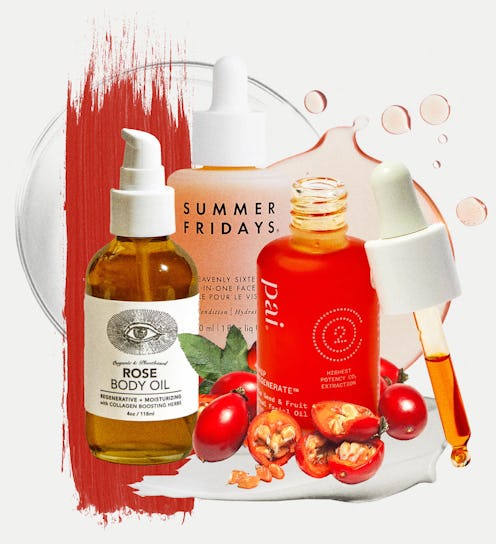(Back To Basics)
Rosehip Oil Is The Missing Piece In Your Glow-Boosting Skin Routine
There’s a reason (or two) it’s so popular.

With new products, brands, and categories popping up every day, beauty can be a bit overwhelming. Back to Basics is our rudimentary beauty series that serves as your crash course on the science behind some of the best formulations in the game. This week, we’re taking a look at rosehip oil for your skin.
The words self-care and skin care can be used interchangeably. With lavish products and ingredients, it’s not hard to develop a routine that’s soothing and relaxing while simultaneously delivering results. A velvety cleanser that washes away impurities and a cooling toner that balances and calms skin are just a few examples. But perhaps, nothing makes a routine feel more luxurious than the addition of a fragrant, moisturizing facial oil. Along with their invigorating scents, these concentrated products provide a number of benefits. So naturally, they’ve become a skin care staple. Take the use of rosehip oil for skin, which imparts nurturing vitamins and antioxidants that can smooth lines and ultimately, create a hydrated, smooth complexion.
In the realm of plant-derived ingredients, rosehip oil has been long revered for its benefits, but it’s commonly confused with rose oil — a substance that comes specifically from the flower’s petals. But there’s much more to this multi-tasking ingredient than its floral scent. “It’s hydrating, moisturizing, and can even increase cell turnover and leaves skin smooth and brightened,” says Dr. Jeannette Graf, M.D., a board-certified dermatologist and assistant clinical professor of dermatology at Mount Sinai School of Medicine in New York City.
Ahead, TZR tapped five experts ranging from dermatologists to estheticians to break down the basics of rosehip oil, including how to incorporate it into your routine and the best products to shop right now.
What Is Rosehip Oil & What Are Its Skin Care Benefits?
Rosehip oil is a cold-pressed oil derived from the shrub’s fruit by the same name. While all rose bushes produce fruit, the Rosa canina species is the most notable for yielding fruits with high concentrations of vitamins and antioxidants, such as vitamins A and C, that are essential for skin health. According to Ashlyn Sousa De Freitas, esthetician, and co-founder of TIEV Medspa in Costa Mesa, Calif., “these core nutrients can create a range of desirable anti-aging effects like firming, tightening, reducing inflammation, and smoothing fine lines.”
In addition to creating a youthful appearance, rosehip oil can also help even skin tone by working to fade scars and hyperpigmentation over time. “Think of it as a super antioxidant,” says Dr. Gary Goldfaden, M.D., board-certified dermatologist and founder of Goldfaden MD. He continues noting that, “top components like vitamin C offer high levels of antioxidant benefits and protection from environmental pollutants, vitamin A acts as an alternative to retinol, and linoleic acid — a fatty acid known to add moisture and plump skin — help to combat dry skin and boost radiance.”
Given its moisturizing benefits, rosehip is also frequently used to combat dry skin. According to Dr. Jodi LoGerfo, D.N.P., a nurse practitioner specializing in dermatology at Mount Sinai Medical Center in New York City, “the skin-loving composition of this oil works to protect your cells against oxidative damage in order to potentially upturn the signs of aging caused by too much sun,” she says.
Who Should Use Rosehip Oil & What Are Its Side Effects?
Many people are weary to use oil directly on their skin for fear of breakouts, but Dr. Goldfaden assures that all skin types, including acne-prone, can reap the benefits of this plant oil. Similarly, Natalie Aguilar, an aesthetician, and nurse at the Los Angeles office of plastic surgeon Dr. Kami Parsa, tells TZR that this oil’s versatility is what makes it so beloved in the beauty industry. “Thanks to its anti-inflammatory characteristics, rosehip oil can be used on various dry skin conditions, including acne, eczema, psoriasis, and rosacea,” she says. She also notes that it can be particularly beneficial for post-surgical patients looking to reduce discoloration after a procedure.
Side effects to using the oil are rare, but as with any topical product, it’s best to first patch test an area to ensure no adverse reactions occur. Compatibility is important, and while it can work on any skin type, it’s advisable to be cautious — especially if you have sensitive skin.
How To Incorporate Rosehip Oil Into Your Routine
Adding rosehip oil to your current regimen is pretty easy and low maintenance. Though the ingredient can be formulated in products such as cleansers, serums, and moisturizers, it’s mostly used in facial oils. “For most individuals, applying rosehip oil once or twice a day, preferably in the morning and evening, can provide the desired benefits,” says Aguilar. However, it's essential to pay attention to how your skin responds and adjust the frequency accordingly.
The Best Rosehip Oil Skin Care Products
This article was originally published on